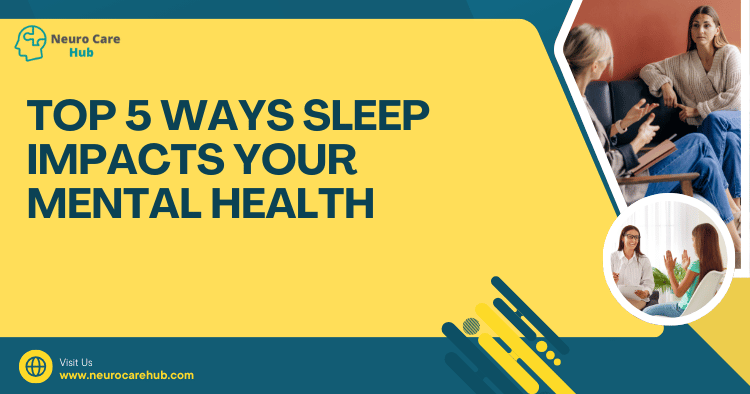Table of Contents
- Introduction
- 1. Sleep Enhances Emotional Regulation
- 2. Quality Sleep Boosts Cognitive Function
- 3. Sleep Affects Stress Levels
- 4. Sleep and Mental Health Disorders
- 5. Establishing a Healthy Sleep Routine
- Conclusion
- FAQs
Introduction
Sleep is often seen as a luxury in our fast-paced world, but its importance in maintaining mental health cannot be overstated. Research shows that quality sleep is vital for emotional stability, cognitive abilities, and overall mental well-being. In this article, we’ll explore the top five ways sleep impacts your mental health, providing insights and tips for improving your sleep habits.
1. Sleep Enhances Emotional Regulation
One of the most significant roles of sleep is its effect on emotional regulation. When we sleep, our brains process emotions and experiences from the day, helping us manage feelings of stress or anxiety.
How It Works
During sleep, particularly in the Rapid Eye Movement (REM) stage, the brain works through emotional memories. This helps reduce emotional reactivity and enhances our ability to cope with stress. A study published in the journal Nature found that sleep-deprived individuals showed increased emotional responses to negative stimuli.
“Sleep is not merely a time of rest; it is a crucial period for emotional processing and mental resilience.”
Practical Tips
- Aim for 7-9 hours of sleep each night. Consistency helps regulate your body’s internal clock.
- Create a calming bedtime routine. Activities such as reading or gentle stretching can signal your body that it’s time to wind down.
2. Quality Sleep Boosts Cognitive Function
Sleep is essential for cognitive processes such as attention, memory, and problem-solving. A good night’s sleep can improve your ability to learn and retain information.
The Science Behind It
Sleep helps consolidate memories, allowing the brain to organize and store information gathered throughout the day. According to a study in The Journal of Neuroscience, sleep deprivation can significantly impair cognitive performance, leading to difficulties in concentration and decision-making.
“Your brain is like a sponge; it needs rest to absorb and process the knowledge of the day.”
Practical Tips
- Limit screen time before bed. The blue light emitted by devices can interfere with melatonin production, making it harder to fall asleep.
- Engage in activities that promote mental clarity. Mindfulness meditation or puzzles can enhance cognitive function during waking hours and are discussed further in Top 5 Ways to Integrate Neuro Care into Wellness Routine.
3. Sleep Affects Stress Levels
Chronic sleep deprivation can lead to heightened stress levels. Lack of sleep increases the production of stress hormones such as cortisol, which can create a vicious cycle of anxiety and insomnia.
Understanding the Connection
When we’re well-rested, our bodies can effectively manage stress. Sleep allows the brain to reset and lowers cortisol levels, leading to improved resilience to stressors. A study from the American Psychological Association found that sleep-deprived individuals report higher levels of perceived stress.
“Sleep is a natural stress reliever; it helps reset our emotional compass and prepares us to face the day.”
Practical Tips
- Practice relaxation techniques. Deep breathing or yoga can help calm your mind before bed.
- Create a sleep-friendly environment. A dark, quiet, and cool room can significantly improve sleep quality.
4. Sleep and Mental Health Disorders
Sleep disturbances are often linked to various mental health disorders, including depression, anxiety, and bipolar disorder.
The Bidirectional Relationship
Poor sleep can exacerbate symptoms of mental health conditions, while mental health issues can lead to sleep problems. For instance, the National Institute of Mental Health highlights that individuals with insomnia are at a higher risk of developing depression.
“Understanding the intertwining nature of sleep and mental health is crucial for effective treatment and recovery.”
Practical Tips
- Seek professional help if needed. If sleep issues persist, consulting a mental health professional can provide tailored strategies.
- Consider cognitive behavioral therapy for insomnia (CBT-I). This therapy focuses on changing sleep habits and misconceptions about sleep, leading to better sleep outcomes. More insights on managing mental health can be found in Top 5 Reasons Neuro Care is Essential in Modern Medicine.
5. Establishing a Healthy Sleep Routine
Creating a consistent sleep routine is crucial for optimizing sleep quality and, subsequently, mental health.
Steps to a Better Sleep Routine
- Set a consistent sleep schedule. Go to bed and wake up at the same time every day, even on weekends.
- Limit naps. While short naps can be refreshing, long or irregular napping can negatively affect nighttime sleep.
- Avoid heavy meals and caffeine before bed. These can disrupt sleep, making it harder to fall and stay asleep.
“A healthy sleep routine is the foundation of mental clarity and emotional balance.”
Practical Tips
- Track your sleep patterns. Using a sleep diary or app can help identify trends and areas for improvement.
- Invest in a comfortable mattress and pillows. Comfort can significantly impact sleep quality, as highlighted in Top 5 Tools Essential in Neuro Care You Should Know.
Conclusion
Prioritizing sleep is essential for maintaining mental health. By understanding the ways sleep impacts emotional regulation, cognitive function, stress levels, and mental health disorders, and by establishing a healthy routine, you can improve your overall well-being. Remember, a good night’s sleep is not just a luxury; it’s a necessity.
FAQs
Why is sleep important for mental health?
Sleep is crucial for emotional regulation, cognitive function, and managing stress, all of which contribute to overall mental health.
How much sleep do I need for optimal mental health?
Most adults need 7-9 hours of quality sleep per night to support optimal mental health.
What can I do if I have trouble sleeping?
If you experience persistent sleep issues, consider consulting a healthcare professional for personalized guidance and treatment options.
Can lack of sleep lead to anxiety?
Yes, sleep deprivation can increase anxiety levels and contribute to a cycle of stress and insomnia.
Are there specific sleep disorders linked to mental health?
Yes, conditions like insomnia and sleep apnea are often associated with mental health disorders such as anxiety and depression.
For more information on sleep and mental health, visit the National Sleep Foundation and the American Psychological Association.






